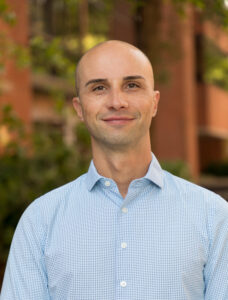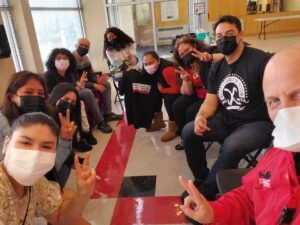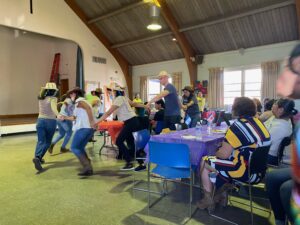Felipe Filomeno, Associate Professor
 “I have worked with immigrant communities – especially those from Latin America – through research, teaching, and service. Being that this work is community-based, it is hard to envision doing it without centering DEIA principles. Over time, I have adopted the following principles/practices to structure my work in ways that are aligned with DEIA goals:
“I have worked with immigrant communities – especially those from Latin America – through research, teaching, and service. Being that this work is community-based, it is hard to envision doing it without centering DEIA principles. Over time, I have adopted the following principles/practices to structure my work in ways that are aligned with DEIA goals:
- A service-based approach to work with communities: Whether I am teaching or researching with immigrant communities, it all starts with service. Before inviting a community group to collaborate in a research project, I volunteer with them, learn about their work, and establish relationships. This means giving before you take. For instance, the project Honest Conversations on Immigration, which I have conducted in partnership with the Latino Racial Justice Circle, started after a year volunteering with them. After a teaching and research partnership has been established and produced results, I keep serving the community partner. This means that not only will you give before you take but also that you will give more than you take. Years after the Mayor’s Office of Immigrant Affairs of Baltimore City collaborated with me in a policy evaluation project, they asked me to serve in a search committee for a deputy director of the office, to which I gladly replied yes.
- An asset-based perspective to work with communities: Public discourse on immigrants is saturated with a deficit perspective that focuses on what they lack (fluency in English, legal status, etc.), but immigrant communities also have cultural wealth, capabilities, and aspirations. We need teaching and research that acknowledges and builds upon those resources. In one research project, for instance, a colleague and I investigated how colleges could leverage the lived experiences of immigrant students to advance the global education of all students.
- A dialogical approach to work with communities: Communication focused on mutual understanding is key to diversity, equity and inclusion. It boils down to humility – an orientation towards the other and away from the self, which makes active listening and the suspension of assumptions possible. The project Honest Conversations on Immigration is centered on dialogue as a cultural and civic practice in faith communities. I have also used dialogue in the classroom. For instance, when I teach POLI200 – Introduction to Political Science, students engage in several rounds of deliberative dialogue, having to identify strong points in liberal and conservative perspectives on various policy issues, integrate strong points into a policy proposal, and vote to choose the best proposal put forward by a group of students.
These three principles overlap and reinforce each other. How can you recognize the capabilities of a community without actively listening to them through dialogue? Is your work in the community really service-based if you do not acknowledge and build upon their strengths? Still, one can never really “master” those principles. There will always be forces pulling us away from them. A promotion or tenure deadline that makes you favor writing a publication for peer-review rather than a publication for the community to read and apply. A tight schedule that leaves you little time to listen and serve the community before making an ask to them. DEIA work is a daily, time-consuming and yet necessary effort.”
Learn more about DEIA efforts in the Department of Political Science here.

